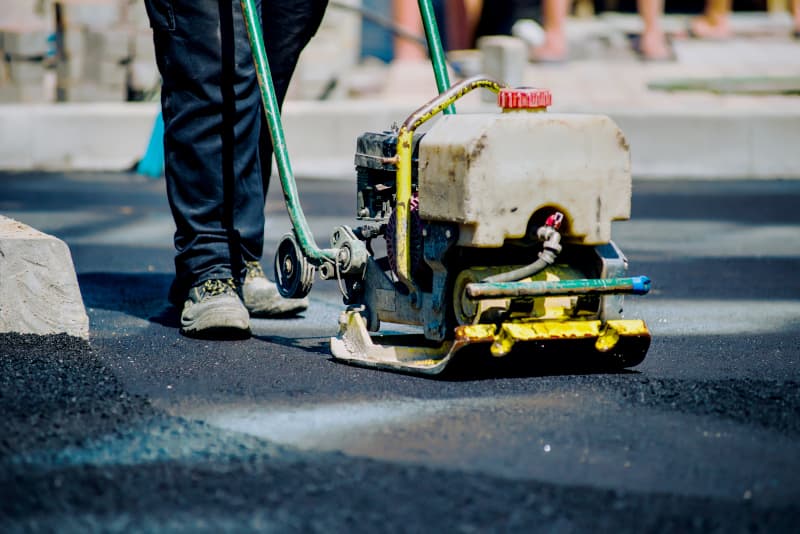Cold Patch vs. Hot Asphalt: Understanding the Differences and When to Use Each
When it comes to asphalt paving, there are two main types of asphalt: cold patch and hot mix. Knowing the difference between hot mix and cold mix asphalt can help you choose the best option for your project, whether you’re patching asphalt in your driveway or tackling a larger paving job.
What is Cold Patch Asphalt?
Cold patch asphalt, also known as cold mix, is a type of asphalt that doesn’t require heating before use. It comes in bags or containers and can be used straight out of the package to fill potholes or patch small areas of damage. Cold mix is a great temporary solution for asphalt repair because it’s easy to use and doesn’t need special equipment.
Pros of Cold Patch Asphalt
- Easy to use: Just pour it in, smooth it out, and let it set
- No special equipment needed
- Great for quick, temporary fixes
- Can be used in colder weather when hot asphalt isn’t an option
Cons of Cold Patch Asphalt
- Not as durable or long-lasting as hot mix asphalt
- May need to be replaced more often
- Not ideal for large areas or heavy traffic
What is Hot Mix Asphalt?
Hot mix asphalt is the most common type of asphalt used for paving roads, parking lots, and driveways. It’s made by heating a mix of aggregate (like gravel and sand) and asphalt cement to around 300 degrees. The hot asphalt mix is then poured onto the surface, spread out, and compacted to create a smooth, durable pavement.
Pros of Hot Mix Asphalt
- Very durable and long-lasting
- Can handle heavy traffic and loads
- Smooth, even surface
- Flexible and malleable, so it can handle temperature swings without cracking
Cons of Hot Mix Asphalt
- Requires special equipment and expertise to install
- Can only be used in warmer weather (usually above 40 degrees)
- More expensive than cold patch asphalt
When to Use Cold Patch vs. Hot Asphalt
Cold patch asphalt is best for small, temporary repairs like filling potholes or patching cracks. It’s a good choice when you need a quick fix and don’t have access to hot asphalt or professional installation services. Cold mix can also be used in colder weather when hot asphalt isn’t an option.
Hot mix asphalt is the way to go for large paving projects like driveways, parking lots, and roads. It creates a much more durable, long-lasting surface that can handle heavy traffic and extreme weather conditions. If you want a smooth, even pavement that will last for years, hot mix asphalt is the better choice.
Maintaining Your Asphalt
No matter which type of asphalt you use, proper maintenance is key to keeping your pavement in good shape. Regular sealcoating can help protect your asphalt from damage and extend its life. If you do notice cracks or potholes starting to form, it’s important to address them quickly to keep the damage from spreading.
For big projects or complex repairs, it’s always best to call in professionals who specialize in commercial paving services. They have the expertise and equipment to handle any asphalt installation or repair job, big or small. They can help you choose the right type of asphalt for your needs and budget, and make sure the job is done right the first time.
Other Factors to Consider
In addition to choosing between cold patch and hot asphalt, there are other factors to keep in mind when planning your paving project. The type of aggregate used in the asphalt mix can affect the durability and appearance of the finished pavement. The thickness of the asphalt layer and the quality of the base material underneath can also impact the longevity and performance of your pavement.
Working with experienced paving contractors can help ensure that all these factors are taken into account and that your asphalt is installed correctly for the best possible results.
The Bottom Line
When it comes to cold patch vs. hot asphalt, there’s no one-size-fits-all answer. Cold mix is great for quick, easy repairs, while hot mix is the best choice for durability and long-lasting performance. By understanding the differences and uses of each type of asphalt, you can make an informed decision for your paving project.
If you’re not sure which option is right for you, just ask the experts at Riley Asphalt. With years of experience in asphalt paving and a commitment to quality workmanship, we’re here to help with all your asphalt needs. Whether you need patching, sealcoating, or a brand new driveway, we’ve got you covered. Contact us today for a free estimate and let us help you choose the best asphalt solution for your project!

